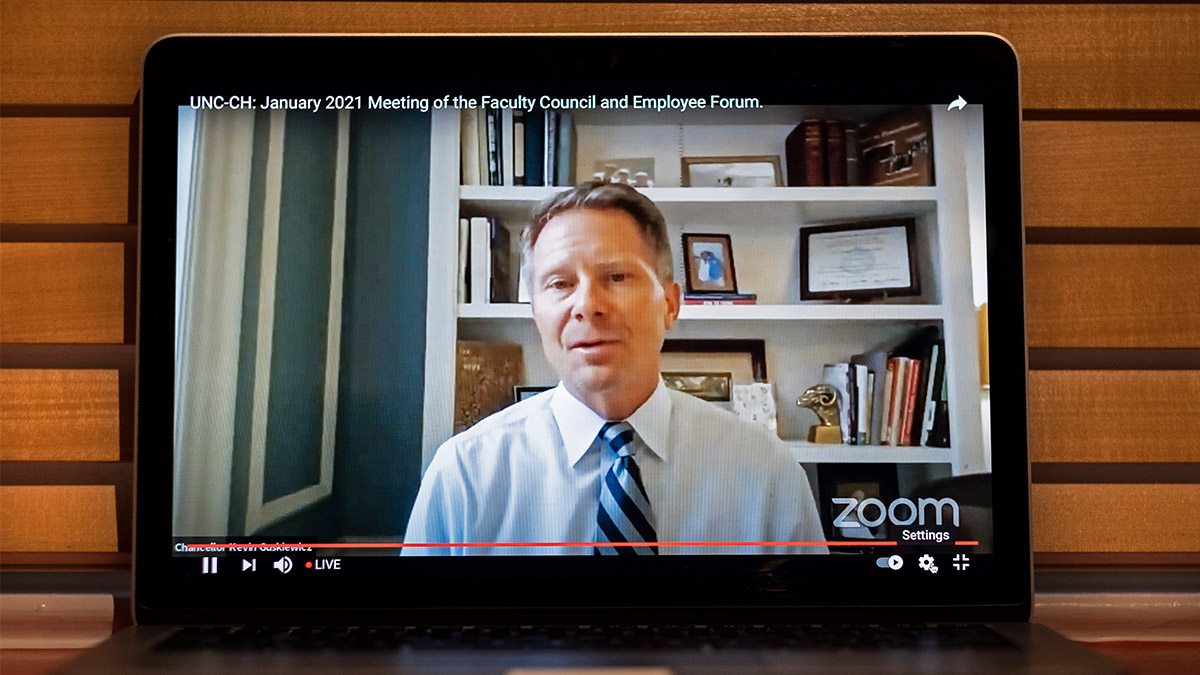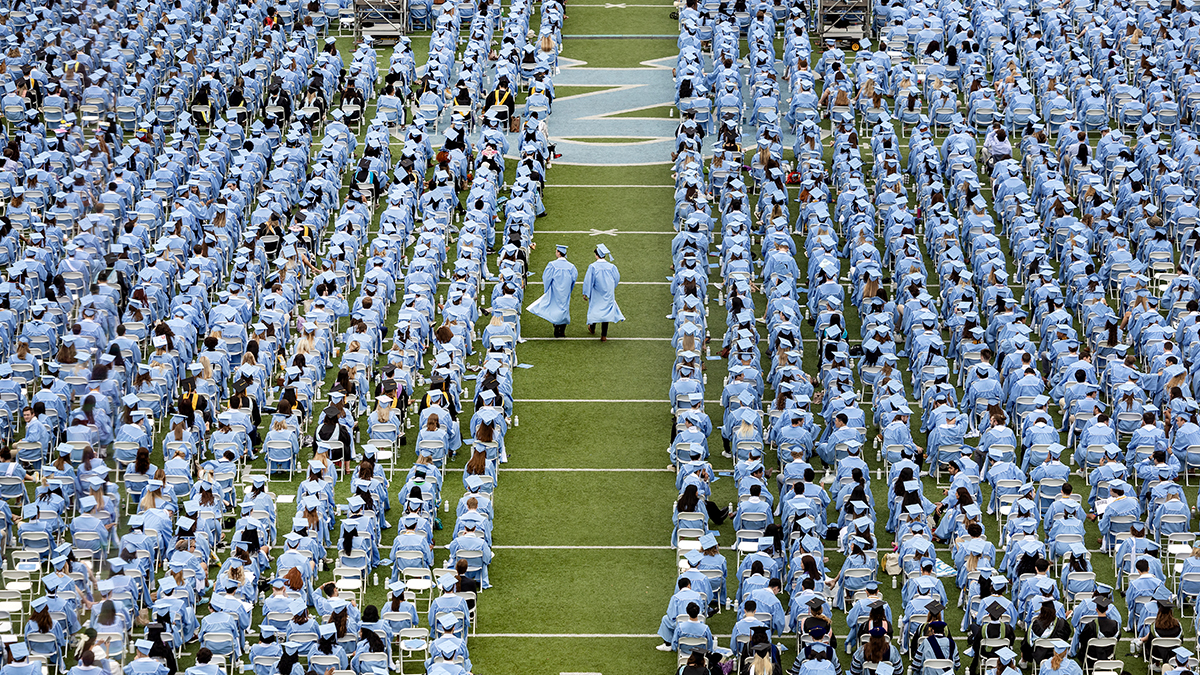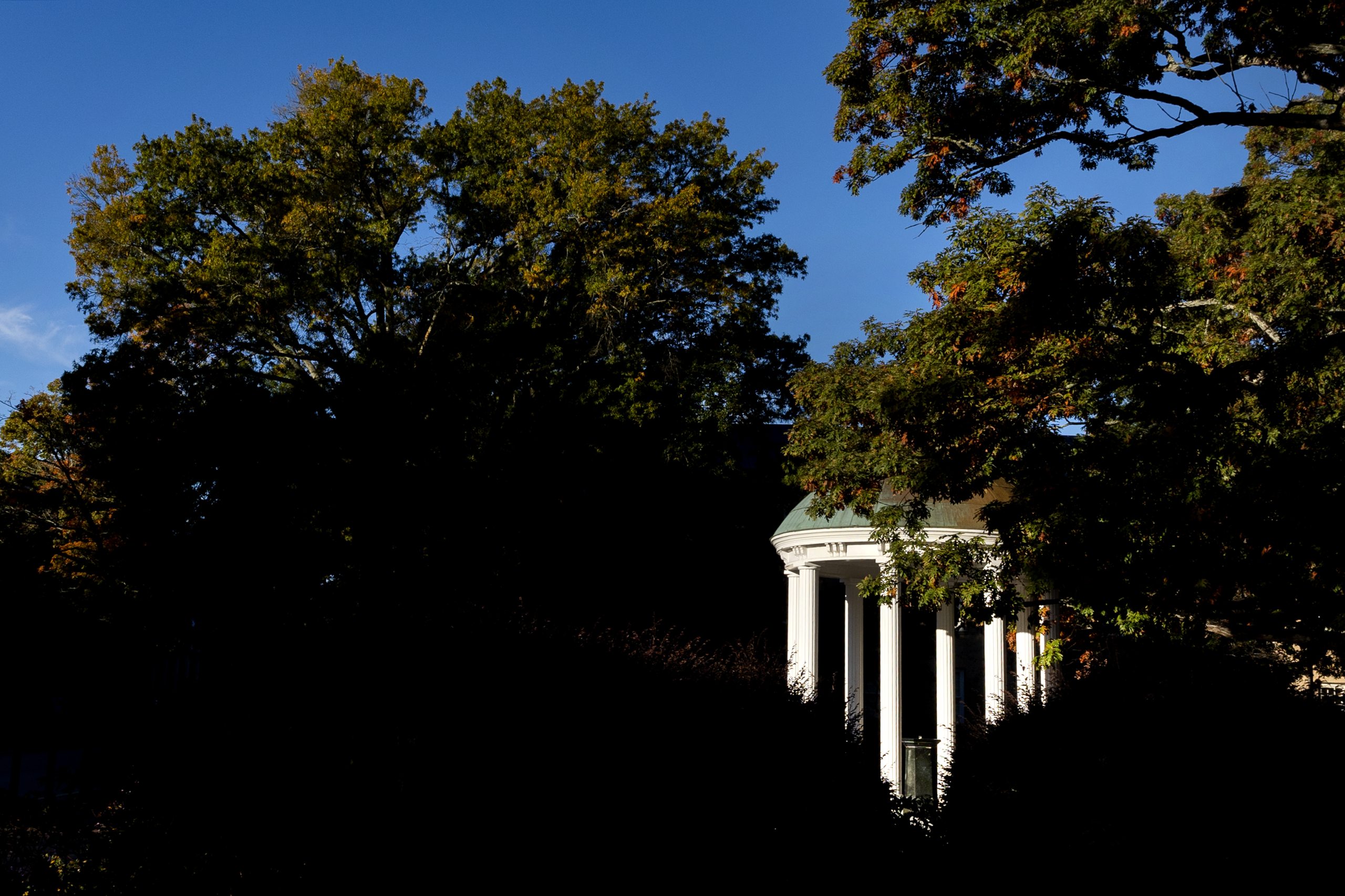Faculty Council, Employee Forum hear budget, spring semester updates in joint meeting
Carolina will implement a 1.5% reduction to personnel funds and a 7.5% reduction to operating funds for this year and next year to eliminate the University’s $100 million structural deficit.

Faculty Council members and Employee Forum delegates heard updates about the University’s budget and spring semester planning during Friday’s virtual meeting.
This meeting was the second time Employee Forum delegates joined the Faculty Council’s monthly meeting to hear updates from Chancellor Kevin M. Guskiewicz and Provost Bob Blouin.
The University has gone for nearly a decade without a balanced budget, Guskiewicz said. He has worked over the past 10 months with deans and vice chancellors to put budget measures into place to begin to address three financial challenges: a $100 million structural deficit, an approximately $200 million deficit in the current fiscal year related to COVID-19 and $850 million in deferred maintenance challenges.
Carolina will implement a 1.5% reduction to personnel funds and a 7.5% reduction to operating funds across schools and units for FY20-21, followed by another 1.5% reduction to personnel funds and a 7.5% reduction to operating funds in FY21-22, he said. The reductions in operating funds will come from the University’s $1.2 billion operational budget that includes central funds from tuition, state appropriations and finance and administration. The $1.2 billion is part of the University’s overall $3.5 billion budget.
This information was shared with all employees on Friday in a campus message from Guskiewicz, Provost Bob Blouin and Interim Vice Chancellor for Finance and Operations Nate Knuffman.
Guskiewicz said these cuts will help Carolina eliminate the $100 million structural deficit in central funds by the end of FY21-22 on June 30, 2022. The University doesn’t yet know what impact the pandemic will have on the budget or how state appropriations will be affected.
“We’re asking the deans to consult broadly about how to implement these reductions. This isn’t going to be easy, but I feel confident we can get through this together. It’s the responsible thing to do for the future of our University,” Guskiewicz said during Friday’s meeting. “And in doing this, as we’ve said repeatedly over the past many months, we’ll aim to protect our mission and our people.”
The new cuts are consistent with those cuts put in place at the beginning of the pandemic, including reductions in hiring and spending, Guskiewicz said, adding that they will remain in place until further notice.
Deans and unit leaders will have autonomy on how they will make the cuts, Guskiewicz said, adding that guiding principles are in place to help with decision-making, including prioritizing work that supports the University’s strategic plan, Carolina Next: Innovations for Public Good.
Once the budget is balanced, the University will create a strategic reinvestment fund to allow schools and units to reinvest in initiatives that align with Carolina Next.
“As we try to prepare for the future and the unknown, we have to come to terms with our spending,” Blouin said. “We cannot continue to spend more than we have.”
If the cuts are not made now, the University could be in a “much worse” position when the impact of the pandemic is known, Blouin said. These changes will put the University in a better position going forward so that Carolina can remain competitive in the future.
Spring semester testing
Online classes for the spring semester begin Jan. 19, with a limited number of students returning for in-person classes on Feb. 8. To ensure a safe return, the University launched the Carolina Together Testing Program, available for free to faculty, staff and students who do not have symptoms of the virus.
In the first week, 6,900 people have been tested, Blouin said. He encouraged those visiting the testing sites to register on HallPass, a web-based application, prior to going to the testing site.
More than 1,000 people have contributed to the creation and development of the testing program, Blouin said, calling it “one of the best examples of Carolina collaboration.” The testing lab is currently processing about 1,000 tests per day but will ramp up to process several thousand tests per day.
More than 200 students who are participating in the Carolina COVID-19 Student Service Corps are helping to staff the Carolina Together Testing Program centers, along with assisting with contact tracing, data review, communications and helping to make testing kits for the centers, said Meg Zomorodi, clinical professor in the School of Nursing and assistant provost for interprofessional education and practice.
COVID-19 vaccine planning
The University has advocated that essential workers in higher education be included in this next phase, said Catherine Brennan, executive director, environment, health and safety. On Friday, the state released guidance that includes higher education instructors and support staff.
Carolina workers in that group include food service, housekeeping, UNC Police, transit and maintenance staff, along with faculty providing in-person instruction.
Carolina is working closely with the Orange County Vaccine Planning Task Force and the Orange County Health Department, Brennan said.
Also, Campus Health has submitted paperwork to be a COVID-19 vaccinator when the vaccine is broadly available for the general population.
News to note
In other news:
- Faculty Chair Mimi Chapman announced that Faculty Council would be creating a Caregiving Task Force, a group that will look at caregiving needs of employees, ranging from child to elder care.
- Guskiewicz said students eligible to graduate in May 2021 will soon receive a survey to gauge opinions about commencement plans. “It is highly unlikely that we will have a large Kenan Stadium ceremony that everybody is craving,” he said, though alternate ideas are under consideration.
- As part of the Appointments, Promotions and Tenure Committee’s report, Committee Chair Karin Pfennig explained the committee’s concern about the impact of COVID-19 on faculty who were coming up on promotion and tenure decisions. The committee is developing recommendations on the use of COVID-19 impact statements that would allow faculty to detail how the pandemic has impacted them, both in the short term but also the long-term effects on career development.
- Faculty Council unanimously approved revisions to the Instrument of Student Judicial Governance, making changes that bring the code up to date, make it easier to navigate, create separate sections for undergraduate and graduate senates and clarify sanctions for repeat offenses.
- Midnight Jan. 19 is the deadline to apply for or nominate someone for secretary of the faculty, a position that supports Carolina’s faculty chair and Faculty Council. The term begins July 1.




